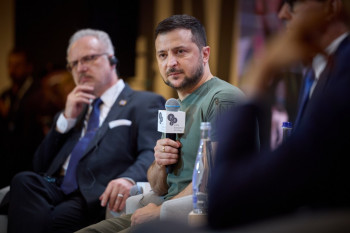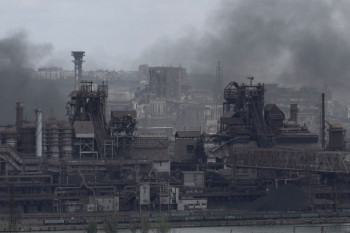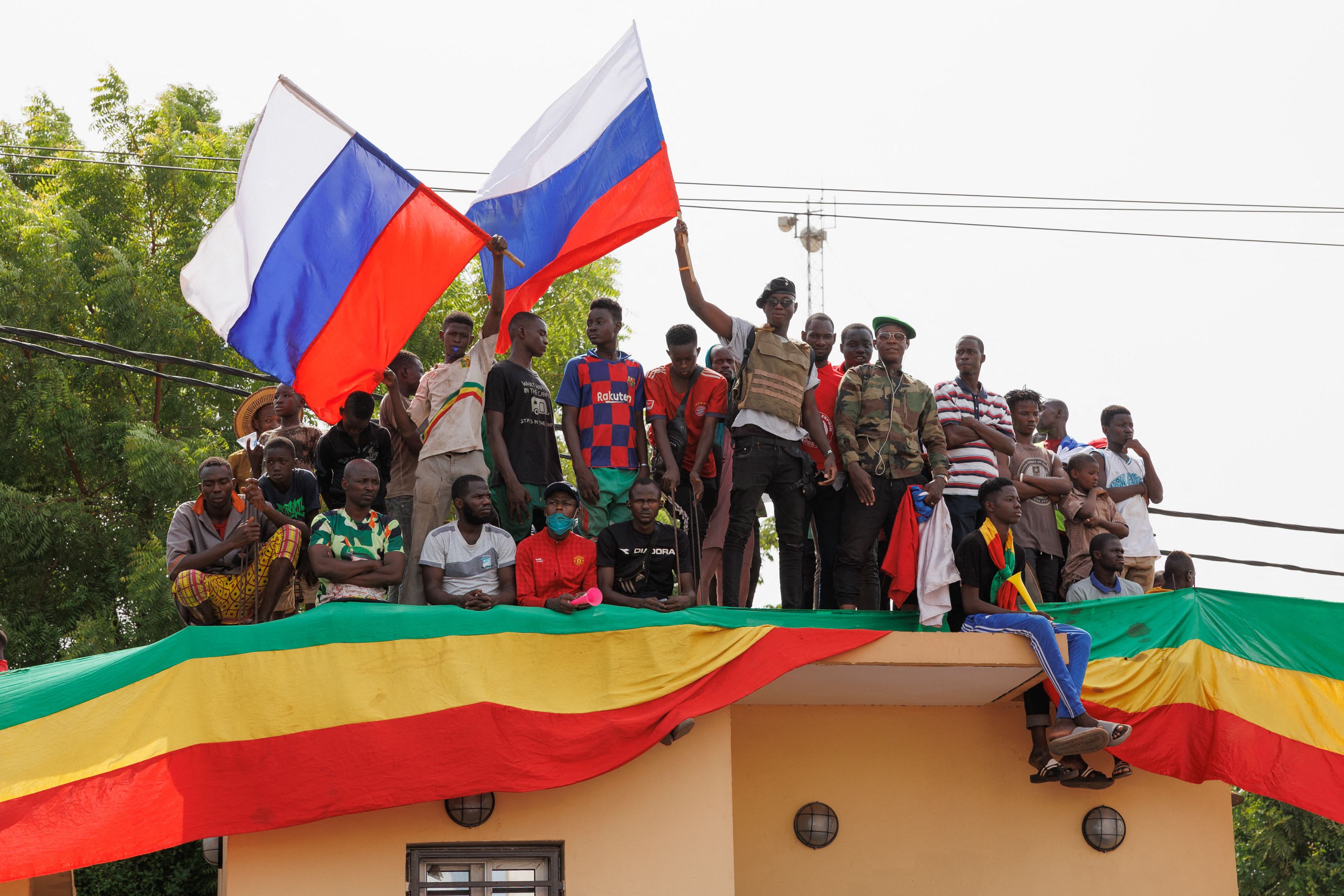Since its independence, Ukraine's diplomatic efforts have focused primarily on looking West. Meanwhile, Russia has set its sights all over the world.
While the Euro-Atlantic world has been firm in its support of Ukraine, condemning Russia's all-out war, the African continent, home to 54 countries and 1.4 billion people, has been absorbed by Russian propaganda that depicts Kyiv and European countries as the villains.
Despite being one of the largest suppliers of grain to the African continent, Ukraine has little capacity to change the tide of public opinion in a region where Russia has been active for nearly 70 years.
Russian Foreign Minister Sergei Lavrov toured the continent in July to ramp up support for his country and blame Ukraine for a lack of food supplies amid Russia’s naval blockade of Ukraine's Black Sea ports, vital for the export of Ukrainian grain. Russian experts, diplomats, and officials have been headlining major conferences across the continent for years.
As Ukraine’s diplomatic efforts in Africa are limited to phone calls with a few African leaders, the Kremlin is preparing a Russia-Africa Summit for late 2022.
The English-language broadcaster Russia Today, banned in many countries as a state-owned propaganda outlet, is among the continent’s primary sources of information about Russia’s war in Ukraine, according to experts watching the region.
"Ukraine has almost no media presence in Africa. Russia is very active there," Denys Moskalyk, co-founder of the Center for African Studies, a Kyiv-based think tank, told the Kyiv Independent. "Russia works with local NGOs and holds pro-Russian rallies in African capitals. And it’s constantly present in the information space, in the social and political life of Africa."
Ukraine has done little to change the picture. Over eight months into Russia's all-out war, no high-level Ukrainian officials have visited the African continent.
In fact, no Ukrainian presidents have visited any sub-Saharan countries since Ukraine gained independence in 1991. And the only president of an African country to visit Kyiv was South African President Jacob Zuma in 2000.
Missing embassies
With forty embassies across the continent, Russia has four times the number of embassies in Africa compared to Ukraine.
One Ukrainian embassy often covers several different countries and ambassadors at times have limited access to the countries they are responsible for due to poor infrastructure. What’s more, Ukraine’s embassies do not always have an ambassador and are typically run by junior staff.
Moskalyk told the Kyiv Independent diplomats often refuse to go to Africa, and diplomatic correspondence between Kyiv and African capitals is brushed off as unimportant.
"Documents, diplomatic correspondence, congratulatory statements sit on desks for months. It's very inefficient," Moskalyk said.
Foreign Minister Dmytro Kuleba is set to visit sub-Saharan Africa this autumn, as Ukraine looks to develop inter-parliamentary connections there, according to Ukraine’s newly appointed Special Representative for the Middle East and Africa, Maksym Subkh. Yet there are only three Ukrainian embassies in sub-Saharan Africa, in Senegal, Nigeria, and Ethiopia.
Meanwhile, Russia’s presence is growing in the region. After the expulsion of Russian diplomats from the West, Moscow has aimed to strengthen its presence in Africa.
Russian propaganda in Africa
In June, President Volodymyr Zelensky addressed the African Union, where Ukraine has observer status. Only four African leaders out of 51 showed up. The rest were represented by lower-rank officials.
In his speech, Zelensky mentioned the colonization of Africa, making the argument that the continent should not support a new form of neocolonialism, referring to Russia's war against Ukraine.
Zelensky also accused Russia of holding Africa hostage with its naval blockade of Ukraine’s Black Sea ports. The speech was met with a dull reaction.
Since the beginning of Russia's full-scale invasion of Ukraine, Russia has been pushing its narratives to form anti-Ukrainian views in Africa.
In particular, Russia has been using the grain crisis that it created by blocking Ukraine’s sea ports, by finding ways to place the blame on Ukraine for failing to provide the grain that many African nations rely on to feed their populations.
In doing so, Russia has portrayed Ukraine as a subordinate to the old colonial West that is deliberately withholding grain to starve the African continent. The fact that Ukraine is backed in the war by France and the U.K., former colonial powers, has helped Russia’s messaging.

In March, less than half of African countries voted at the United Nations to condemn Russia's war. Seventeen African Union members were absent.
Russia has also developed several military alliances with African regimes, including Libya, Mali, Sudan, the Central African Republic, and Mozambique, providing them with arms, training, and support on missions.
African Union President Moussa Faki Mahamat and President Macky Sall of Senegal, Ukraine's sixth biggest economic partner in Africa, both met with Putin in June.
They came to Moscow to call for a "political solution" to Russia's war to reopen supply lines. Both also attempted to reverse the decision to exclude Russia from the global SWIFT financial messaging system in order to ease payments.
Kenya, one of Ukraine's top 10 trade partners in Africa, condemned Russia's war but has declined a request by Ukrainian Ambassador Andrii Pravednyk to address the country's parliament. The African Union also declined Zelensky's bid to address the block at first.
Since February, Zelensky has talked to media outlets from Nigeria, Ghana, South Africa, and Kenya and held rare phone calls with some African leaders.
Subkh said Ukraine "uses all the tools of information warfare to counter Russian propaganda" in Africa, but it simply can’t compensate for years of Russia’s presence in the continent’s media and political life.
Ukrainian and African markets
Russia’s efforts have also been aimed at cutting Ukraine’s access to African markets. Before the invasion, Ukraine was on a good track: In 2021, it increased trade with all five of its top partners in Africa.
When the invasion started, one immediate casualty was Ukraine’s grain supplies – and Africa felt it.
In 2021, African countries received over 6.7 million metric tons of grain from Ukraine – 13% of all Ukrainian grain exports.
The biggest buyer was Egypt – in 2021, the nation imported grains worth $1.39 billion from Ukraine, or 29% of the country's total grain imports.
Once the invasion began and Russia blocked Ukraine’s Black Sea ports preventing agricultural products from reaching Africa and the Middle East, the Kremlin quietly exported its own goods to Ukraine's former trade partners, while also blaming Kyiv for the food crisis.
Russian sea caravans have been arriving at African shores, selling its grain where Ukraine’s was now absent.
This will push African countries to look for new suppliers as they can no longer rely on Ukraine, Moskalyk said.
"Russia wants to replace Ukraine as the guarantor of food security in the region," he added.
In August, Ukraine started exporting a limited amount of grain from its Black Sea ports within a U.N.-brokered deal signed by Ukraine and Russia in July.
Following the deal, Ukraine has exported over 3.7 million metric tons of grain as of mid-September. Earlier, officials said that over 22 million metric tons of grain were stuck in Ukraine, waiting to be shipped.
In addition to grain, Ukraine’s exports to Africa include metal products, fats and oils, tobacco, fertilizers, vegetables, poultry, turbines, and equipment for power plants. If Ukraine was to lose access to those markets it could cost Ukraine up to $4 billion a year, Moskalyk warned.
The Ukrainian government is also hoping to cooperate with African countries in other sectors.
The Ukrainian Foreign Ministry listed a variety of interests in African countries, ranging from metallurgy to aircraft manufacturing.
"We are looking at these countries as possible partners in exporting knowhow, technology, joint I.T. projects, humanitarian programs," Subkh told the Kyiv Independent.
In addition, Ukraine could cooperate in the military sphere, Moskalyk said. "In a few years, Ukraine could receive an extra $5 billion per year" from cooperation, he added.
But “achieving political support in Africa will depend on the skills of Ukrainian diplomacy," Subkh said.













